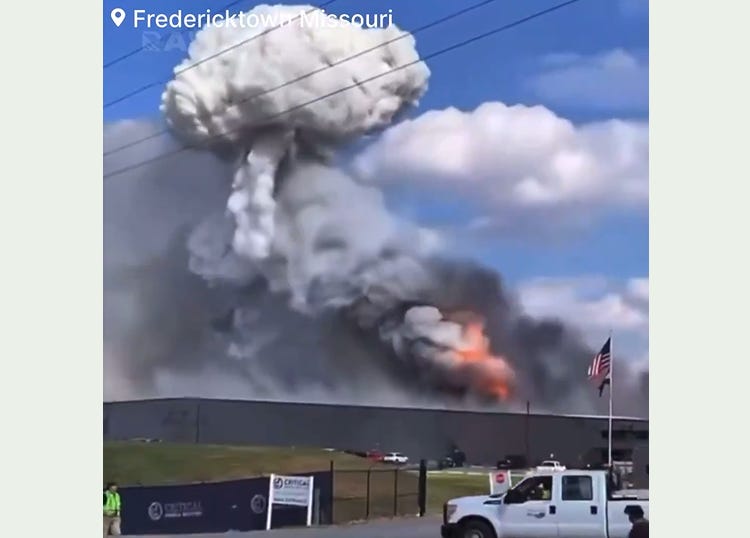Ok, this is really not funny anymore - it never actually was. But cars and plants in which lithium-ion batteries are used, manufactured, or recycled just keep bursting into flames, causing massive explosions and fires, and putting drivers, passengers, homeowners, and workers in great danger. At some point, the policymakers responsible for pushing this limited, hazardous non-solution on the public need to be forced to pay attention to the rising problem.
On Wednesday, local media in Cape Girardo Missouri reported that a plant that processes used-up lithium-ion batteries in nearby Fredericktown suffered a massive explosion and fire that could be seen for miles around. Local firefighters and public safety officials issued a shelter-in-place order for nearby residents, warning them to shut all doors and windows and turn off A/C units for fear of being hit with toxic fumes from the chemical-laden fire.
Here’s an excerpt from a report at KFVS-TV in Cape Girardo:
FREDERICKTOWN, Mo. (KFVS) - Crews are on the scene of a large commercial fire on Wednesday afternoon, October 30.
According to the Missouri State Highway Patrol and the Madison County sheriff, the fire was reported around 1:37 p.m.
Sgt. Clark Parrott with the Missouri State Highway Patrol said troopers are on the scene of a fire at Critical Mineral Recovery, a lithium-ion battery processing plant, in the 800 block of Highway OO in Fredericktown to assist with traffic control.
...
No injuries have been reported at this time.
According to the highway patrol and sheriff, they have been in contact with company representatives and they are not concerned about hazardous exposure.
The Fredericktown Fire Department urged residents to shelter in place indoors if they are in the smoke plume. They say you should close your windows and doors and turn off window AC units.
[End]
This is a nightmare.
Here’s further information filed by Spectrum Local News:
Critical Mineral Recovery is one of the largest lithium-ion battery processing facilities in the world, according to company's website. The plant has the capacity to process more than 60,000 tons of electric vehicle and consumer-grade lithium-ion batteries.
[End]
A report on MSN News adds this information:
The fire was sparked at a lithium-ion-battery processing plant owned by Critical Mineral Recovery. On its website, the company says the 225,000-square-foot plant is used to “recycle lithium-ion-battery-related materials from battery manufacturers, automotive OEMs, battery dealers, recyclers, and processors worldwide,” and describes it as “one of the largest lithium-ion battery processing facilities in the world.” The Fredericktown Fire Department said it was responding, and the Bismarck Fire Protection District said they were providing support. The dense smoke billowing from the blaze prompted Madison County authorities to issue evacuation orders in one area of Fredericktown. Other local residents were advised to shelter indoors. No casualties had been reported.
[End]
These fires and explosions and hazardous, toxic fumes are becoming increasingly commonplace all over the world now. They spew actual, real, heavy pollution that far offsets and supposed benefit to the plant through the reduction of plant food in the atmosphere that EVs might provide. Eventually.
You’re supposed to believe that EVs are “green.” They aren’t, and videos like this are the proof.
That is all.




While lithium in batteries can be useful, the scale of the battery or facility appears related to the risk. While we use these lithium bombs, it is important - perhaps even critical - that those involved with use, handling, and manufacturing be better trained on the risk and risk mitigation. Yes, that means the vehicles should be sold only with a training program. The cost of dealing with the fires is loaded onto taxpayers but I believe should go back to the owner of the failed battery. The awareness of the danger and risk is downplayed by manufacturers and the regulatory agencies - which is truly absurd.
My old '79 Websters : "Lithium: a soft silver-white element of the alkali group that is used ...
esp. in nuclear reactions..." Hmmm.
I guess this is one way to recycle batteries into something else.
How many data points do we need to quantify risk?